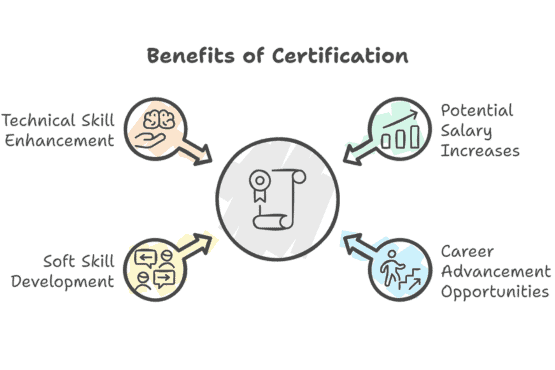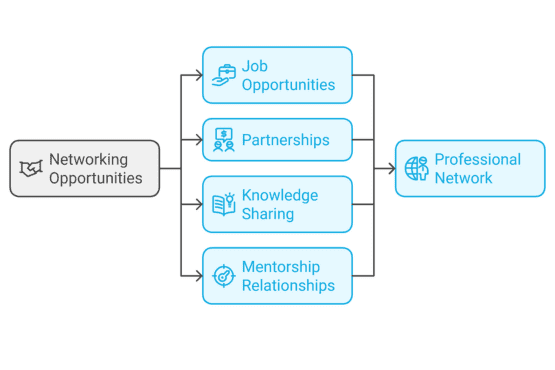Trade marketing has a significant impact on business. It connects manufacturers, wholesalers, and retailers. This field makes supply chains work better, creates good promotions, and puts products in the right spots to sell more. More and more companies want skilled trade marketers with relevant trade marketing certifications these days.
However, many people in this job run into problems because they don’t have formal schooling or official credentials. This makes trade marketing certifications look more attractive.
But is getting one of these certifications worth it? We’ll examine how valuable trade marketing certification is and help you determine if it’s a good move for your career.
1. Benefits of Trade Marketing Certifications

Potential Salary Increases
Studies show that trade marketing pros with certifications make more money than those without. A new survey in the industry found that people with certifications saw their pay go up by about 15% within two years of getting certified.
Career Advancement Opportunities
Getting certified can lead to new jobs and more responsibility. Many bosses see certification as a sign that you’re committed and know your stuff, giving certified pros a leg up when job hunting.
Soft Skill Development
Certification programs often incorporate training in crucial soft skills such as:
- Effective communication
- Problem-solving
- Team collaboration
- Leadership
These skills are invaluable in navigating the complex relationships inherent in trade marketing.
Technical Skill Enhancement
Certification courses typically cover a range of technical skills specific to trade marketing, including:
- Category management
- Pricing strategies
- Supply chain optimization
- Data analysis for decision-making
2. Industry Recognition

Credibility in the Job Market
A recognized certification is a testament to your knowledge and dedication to the field. It can significantly enhance your credibility with potential employers and clients.
Evolving Perception of Certification
The perception of trade marketing certification has evolved over the years. What was once seen as optional is now often viewed as a valuable differentiator in the industry.
Current Trends Impacting Certification Value
The increasing complexity of global markets and the rise of e-commerce have further emphasized the importance of specialized knowledge in trade marketing, boosting the value of relevant certifications.
3. Trade Marketing Certifications
Several organizations offer trade marketing certifications. Here’s an overview of some key programs:
- Certified International Trade Marketing Specialist (CITMS)
- Focus: Global trade marketing strategies
- Duration: 6 months (part-time)
- Certified Trade Show Marketer (CTSM)
- Focus: Event marketing and trade show strategies
- Duration: Flexible, typically completed within 1-2 years
- American Marketing Association (AMA) Professional Certified Marketer (PCM)
- Focus: Broad marketing principles with trade marketing electives
- Duration: Self-paced, exam-based
- Sales and Marketing Executives International (SMEI) Certification
- Focus: Sales and marketing integration
- Duration: Various programs available
- Institute of Export & International Trade (IOE&IT) Certifications
- Focus: International trade and marketing
- Duration: Various programs ranging from 3 months to 1 year
Each certification offers unique benefits and focuses on different aspects of trade marketing. Your choice should align with your career goals and the specific area of trade marketing you wish to specialize in.
4. Time and Financial Investment

Cost Breakdown
Certification costs vary widely, ranging from a few hundred to several thousand dollars. Factors affecting cost include:
- Program duration
- Depth of content
- Reputation of the certifying body
Time Commitment
Most certifications require a significant time investment. Programs may range from a few months to over a year, depending on their complexity and your chosen pace of study.
Many certifications offer flexible learning options, including:
- Online courses
- Part-time study
- Weekend workshops
Return on Investment (ROI)
When considering ROI, look beyond just potential salary increases. Other factors to consider include:
- Improved job satisfaction
- Expanded professional network
- Greater confidence in your abilities
- Enhanced job security
5. Real-World Application
The true value of certification lies in how you apply the knowledge gained. Here’s a real-world example:
Case Study: Improving In-Store Performance at Nestle
A newly certified trade marketing manager applied her learning to revamp her company’s in-store strategy for a struggling product line.
Actions taken:
- Analyzed point-of-sale data to identify optimal shelf placement
- Negotiated with retailers for premium positioning
- Designed new promotional materials based on consumer behavior insights
Result: Sales for the product line increased by 35% over six months, outperforming category growth.
This case demonstrates how certification knowledge can translate into tangible business outcomes.
6. Alternatives to Certification
While certification offers many benefits, it’s not the only path to success in trade marketing. Consider these alternatives:
- On-the-job training: Learn through hands-on experience
- Mentorship programs: Gain insights from experienced professionals
- Industry conferences: Stay updated on trends and network with peers
- Self-study: Utilize books, online courses, and industry publications
Each option has its pros and cons. Carefully consider which approach aligns best with your learning style and career goals.
7. Challenges of Self-Learning
Self-study, while flexible, comes with several challenges:
- Lack of structured curriculum
- Limited feedback on your progress
- No formal recognition of your efforts
- Difficulty in accessing up-to-date, industry-specific information
Certification programs address these issues by providing a clear learning path, expert guidance, and a recognized credential upon completion.
8. Transitioning Careers with Certification
Certification can be precious for those looking to shift into trade marketing from other fields. It provides a foundation of knowledge and demonstrates commitment to potential employers.
Many professionals have successfully transitioned from roles in general marketing, sales, or even unrelated fields into trade marketing after obtaining relevant certifications.
9. Networking and Community Building
Many certification programs offer networking opportunities, connecting you with peers and industry leaders.

These connections can lead to:
- Job opportunities
- Partnerships
- Valuable knowledge sharing
- Mentorship relationships
The professional network you build during certification can be as valuable as the knowledge gained.
10. Industry-Specific Certifications
Some industries have specific trade marketing certifications. For example:
- Retail-focused certifications offered by the National Retail Federation
- Consumer goods-specific programs from the Consumer Goods Forum
These specialized credentials can be precious if you target a specific sector.
11. International Recognition
In an increasingly interconnected business world, certifications with international recognition can be especially valuable. Many programs now offer globally acknowledged credentials, opening doors to opportunities abroad.
Consider the geographical scope of your career aspirations when choosing a certification program.
12. Continuous Learning Importance
Obtaining a certification is not the end of the learning journey. The field of trade marketing evolves rapidly, influenced by technological changes, consumer behaviour, and global trade dynamics.
To maintain the value of your certification:
- Engage in ongoing professional development
- Attend industry events and webinars
- Stay informed about emerging trends and technologies
- Consider pursuing advanced certifications or specializations
Many certification programs offer continuing education options to help you stay current in the field.
13. Enhancing Entrepreneurial Ventures
For those considering starting their marketing consultancy or agency, certification can provide credibility and a knowledge base to serve clients effectively.
Certification can help entrepreneurs:
- Establish credibility with potential clients
- Develop a framework for service offerings
- Stay updated on industry best practices
14. Emerging Trends in Trade Marketing
As you consider certification, be aware of emerging trends that are shaping the field:
- Increased use of data analytics in decision-making
- Growing importance of e-commerce strategies
- Rise of Omni channel marketing approaches
- Emphasis on sustainability and ethical sourcing
Look for certification programs that address these trends to ensure your skills remain relevant.
Final Thoughts
Trade marketing certification allows you to boost your skills, advance your career, and earn more. While it takes time and money, many pros think the payoff is worth it.
Keep in mind that getting certified isn’t a cure-all. Its worth comes from putting what you’ve learned into practice and improving as a professional. Consider where you want your career to go, how you learn best, and what your industry needs when deciding if getting certified is right for you.
Whether you get certified or look into other ways to grow, staying committed to learning new things and getting better at what you do is crucial to doing well in the ever-changing world of trade marketing.
Take your time to look into different programs, talk to people who’ve been certified, and think about how getting certified fits with your long-term career plans. Your journey to grow in trade marketing begins with making a smart choice about how to develop yourself.




